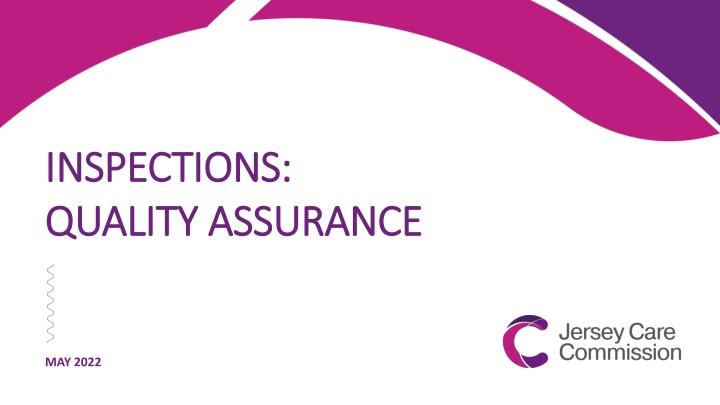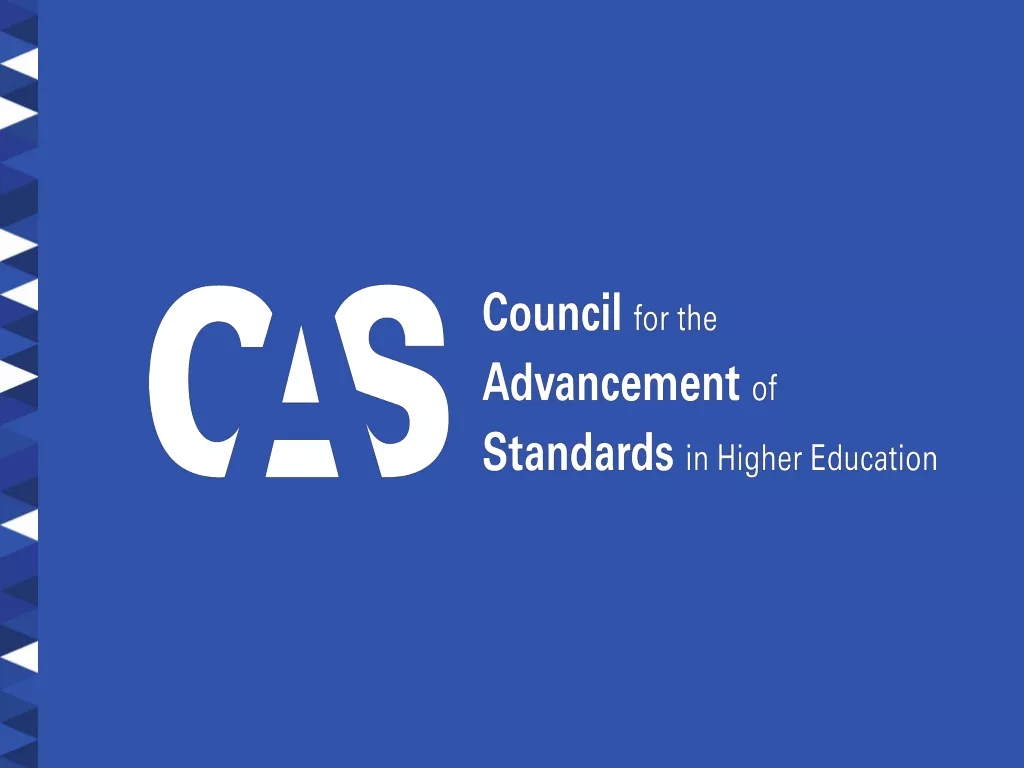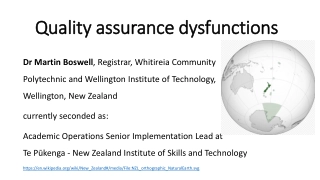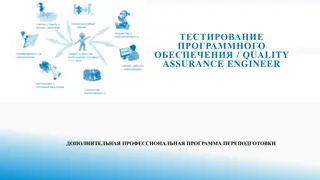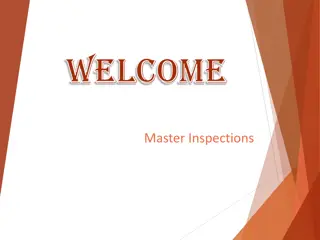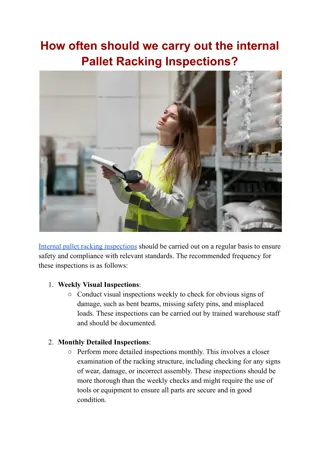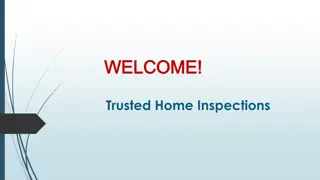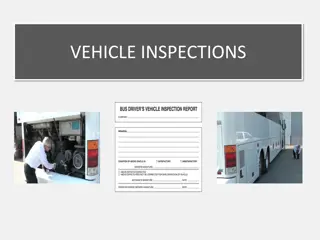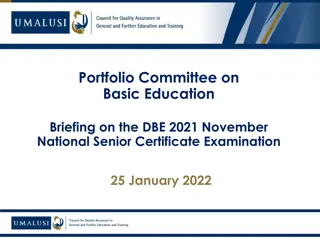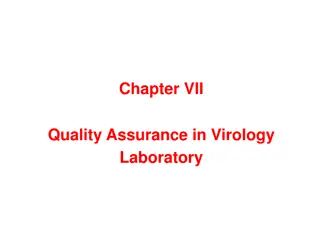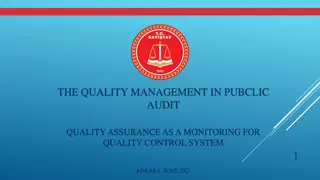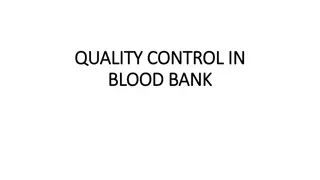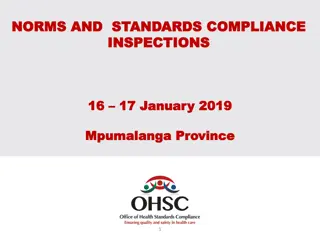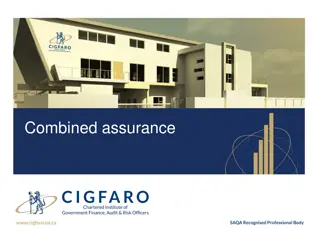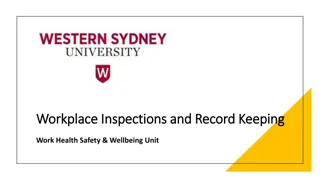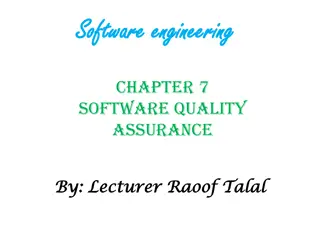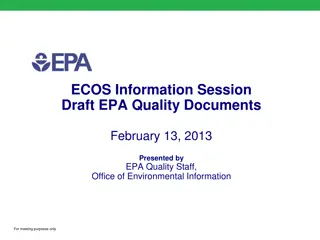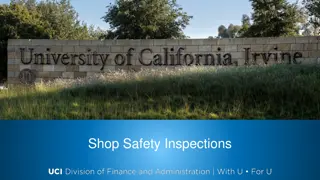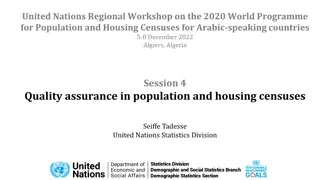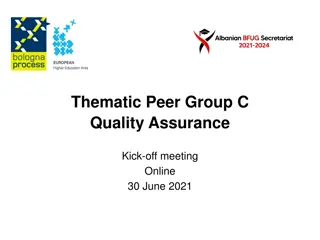Insights into Quality Assurance Inspections and Compliance Standards
The Commission drives care standards improvement by working with agencies to identify best practices and areas needing improvement. Providers shared feedback through questionnaires, indicating preparedness for announced inspections and interactions with inspectors. Inspectors engaged with staff, care recipients, and families, adhering to Covid-related restrictions. Collaboration and communication are key in ensuring quality assurance in care services.
Uploaded on Aug 01, 2024 | 0 Views
Download Presentation

Please find below an Image/Link to download the presentation.
The content on the website is provided AS IS for your information and personal use only. It may not be sold, licensed, or shared on other websites without obtaining consent from the author.If you encounter any issues during the download, it is possible that the publisher has removed the file from their server.
You are allowed to download the files provided on this website for personal or commercial use, subject to the condition that they are used lawfully. All files are the property of their respective owners.
The content on the website is provided AS IS for your information and personal use only. It may not be sold, licensed, or shared on other websites without obtaining consent from the author.
E N D
Presentation Transcript
INSPECTIONS: INSPECTIONS: QUALITY ASSURANCE QUALITY ASSURANCE MAY 2022 1
Our Role The role of the Commission is to drive improvement in standards of care across the sector. It adopts a light touch approach, only resorting to escalation and enforcement processes when absolutely necessary. Wherever possible, the Commission intends to work in partnership with agencies, identifying areas of good practice as well as areas of improvement. It is important to note that providers/managers provide feedback throughout the year, outside of this process. Approximately 60 questionnaires were sent out and we received: The Commission values feedback from the regulated sector about all aspects of its work and particularly about the inspection process. In 2020, following an inspection, a meeting was held with the providers and managers of a small number of care homes and home care providers. This became less feasible as a result of the pandemic, and it was decided to devise a questionnaire to send out as an alternative. The feedback is as follows. 2
If the inspection was If the inspection was announced, were you announced, were you able to prepare for the able to prepare for the inspection? How did inspection? How did you do this? you do this? Responses Responses I printed a copy safeguarding and recruitment policy. I also gave the Regulation Officer phone numbers of staff and some clients as requested. Preparation was mainly just checking, but things were all in order and up to date. Yes, I was able to email the Regulation Officer all the documents she requested before the inspection date. It is apparent that managers and providers were able to make use of the period of notice to ensure that they were better prepared for the inspection. For example, relevant documentation could be collated. Ensured files up to date, reviewed Statement of Purpose and had relevant documents ready i.e., mandatory training records Ensured all paperwork could be collated to make process faster, ensured office space was clear of staff to ensure maximum distancing for Covid requirements. Had a chance to contact clients and staff to gain consent for contact by Inspector for feedback. For efficiency, we prepared in advance all the require paperwork, evidential records, and HR files. having the inspection announced (meant that) I was able to ensure that someone was (present at the) home, also at the time I managed another two homes, so I was also able to ensure that I was at (name of care home) for the inspection. I ensured that paper copies of roster and relevant paperwork were available for the Inspector to take. Ensured that all clients and family were made aware of visit and able to ask any family members who wished to attend and meet the Inspector that they were welcome to do so. 3
Did the inspector speak with staff/care Did the inspector speak with staff/care receivers/relatives? receivers/relatives? Did the inspector introduce Did the inspector introduce themselves on arrival and themselves on arrival and explain the purpose of the visit? explain the purpose of the visit? The responses overwhelmingly indicate that this happened although comment was made that this was sometimes difficult to achieve on account of Covid- related restrictions. It is positive to note that the response to this question was unanimous and that this always happened. Yes she spoke to staff on shift and also care receivers in the house at the time. the Regulation Officer also contacted other staff members by email and made contact with family members after the inspection. Yes, and also signed into the visitor s book. Yes, both introduced themselves fully and outlined how the inspection would be undertaken. Yes, she met with some staff and residents. Telephone contact was made with some relatives. Yes, the Regulation Officer was professional and showed her ID and introduced herself to all of the Staff and Residents. Staff and Residents were aware of the Inspection. Yes and also made notes of social workers that have been involved so she could get feedback Yes, The Inspector introduced herself as the Regulation Officer and explained what she would be looking for. Did the inspector speak with the Did the inspector speak with the manager of the service? manager of the service? The responses were unanimous, and it was apparent that this took place on every occasion 4
How long did the inspection last and was this length of time was appropriate? How long did the inspection last and was this length of time was appropriate? The responses varied widely. It is important to note that the types of services which the Commission inspects range from small home care providers to very large care homes. Consequently, it is likely that inspection methodology, including their duration will be tailored according to the needs of the service. The shortest time cited was two hours. In this instance, the respondent expressed that: for this organisation, it was long enough to cover all requirements. The feedback does not generally suggest that inspections lasted an inordinate length of time, with most respondents commenting that inspections lasting a few hours or up to one day were of appropriate length. In some cases, inspections lasted for two or three days. Over two days, I understand they need to gain a full picture of the care provision, it does take time. Over 2 days. Long enough! 2 days too long Due to the notice the day before and A/L taking place, this happened over 3 visits spanning a month. I was fine with this. 5
Were any areas of concern Were any areas of concern noted by the inspector and noted by the inspector and discussed at the time? Were discussed at the time? Were these findings reasonable? these findings reasonable? it is worth noting that Covid has caused issues with recruitment and track and trace is very frustrating but it is the law. Yes, Staff needing Advanced course in Autism, and update with Makaton, very reasonable, I am in agreement. We talked about the home, any areas of concern, also what the future of the home would look like. Some inspections did not identify any areas of concern. Where these were noted, it appears to be the case that these were regarded and responded to positively by providers and managers, although there were occasional areas of disagreement. Yes, Company policies were discussed. We use a UK company to help with our policies and it was highlighted that they make reference to the QCC instead of the Commission. This has since been rectified. No areas of concern however the inspection prompted useful discussions which is helpful to me as a new manager. Care plans/plans of care were in the process of being updated and rewritten, I felt it was unfair that that was in our report (N.B. the respondent highlighted another area which she also felt ought not to have been included in the inspection report). Staff training was discussed and highlighted, and actions have been initiated in this area. Policies and Procedures In some cases they need updating and an actual safe recruitment policy is needed. the Regulation Officer showed the Care Home Manager her findings and it was agreed she was reasonable with her recommendation. Yes, amendments to be made to a couple of processes, reasonable and informative for future. Yes, two areas of improvement were identified and discussed, these were reasonable areas for improvement 6
Did the inspector provide a Did the inspector provide a summary of findings at the summary of findings at the end of the inspection? end of the inspection? Did the inspection report accurately reflect the discussions/summary during the visit? All respondents said that this happened. Summaries were provided verbally in most cases although occasionally this happened via email (this may have been due to the manager not being on site at the time of the inspection). One concern was noted in that although the inspector indicated that there would be no improvements required, the report included two. All but one of the respondents indicated that the report was fully aligned with the discussions during the inspection visit. The one exception noted that the inspection report did not fully accord with the visit, and that further discussion took place via MS Teams and emails afterwards. 7
Was the inspection report well Was the inspection report well- -written? Did it make sense? written? Did it make sense? The feedback was overwhelmingly positive. Comments included that reports were very comprehensive and well-written , well structured , articulate . One respondent noted that they felt the need to challenge some areas but that this had not resulted in the change which they were wanting. Were any areas for improvement identified? Were the Were any areas for improvement identified? Were the timescales for improvement appropriate? timescales for improvement appropriate? Where such areas were identified, the timescales were considered to be reasonable , appropriate or manageable . One respondent commented that no consideration was given to the additional costs associated with making the improvements. 8
What has been the impact What has been the impact of the inspection upon the of the inspection upon the service? Was the service? Was the inspection process of inspection process of benefit to the service? benefit to the service? Inspection is an important part of the care industry and valuable to maintain standards. benchmarking exercise for all the processes and procedures carried out by the business. It has allowed us to understand what we are doing right so we can carry on in that vein, whilst making appropriate improvements as we go along. Gave assurance that we are working towards our goal of person focused care for all relatives. I felt (reassured) that I was doing everything correct. We have acknowledged areas and taken on board where concerns were raised. We have always welcomed inspections, accepting both fair negative comments and positive feedback. We see this as a way to further develop the service in a proactive way that is transparent and evidenced. Think it s beneficial and highly relevant to ensure we are providing safe and effective care. A range of responses were provided in answer to these questions, and these demonstrate that various positive changes have taken place as a result of the inspection process. The inspections do benefit the organisation, they pick up sections we may have overlooked. Yes of great benefit in terms of independent oversight and in providing leverage for implementing improvements. Absolutely, it gave the residents and staff support, reassurance that the upheaval they had been living through was going to be worth it and that higher standards are being and will continue to be achieved with their effort. The inspection process was a benefit as it highlighted the errors with the UK company we use for our policies. We brought this issue to their attention, and they have since reduced our fees. An external review is always of use to us as we are passionate about enhancing lives and continuous improvement of our services. The inspection was and should be a catalyst to actions that enhance and improve the service. Any care setting should welcome, and benefit from, the opportunity that fair inspection provides It is always helpful to have affirmation that your efforts are focused on the correct things. This being the first inspection it was a very useful 9
How can the inspection process be improved? This question generated in many varied responses. One respondent suggested that inspections be undertaken more frequently. Another commented that the inspection process had taken too long and should have been completed within a shorter period. Other comments included: I think we need to be able to feedback to Commission on the Standards and changes required. (N.B. This respondent felt that the Standards relating to care homes are in need of review). An overall rating system would be good. We feel the process is fair and the communication between service provider and inspector is good. I am happy with the inspection process for my areas. I don t feel there is any need for improvement. I feel that the inspection process works well by including the views of the relatives and staff. Any recommendations made are recognised as being in the best interests of the residents, staff and (care home) as an organization. This respondent felt that inspectors should consult others alongside relatives to ascertain views on service provision. I believe the JCC has it right. As managers we know the expectations from the inspection process. The inspectors talk to us with respect and in a collaborative way to achieve the best outcomes for the residents in the homes. The provision of a documented summary to be available at the end of the visit 10
Have you needed to contact the Commission outside of inspections? Has the Commission been helpful? Yes and they have clarified points and duty of care. The Commission has been very helpful and (has) guided me. We have felt supported by individual Inspectors who have been very helpful. Yes and Yes, I usually phone the Regulation Officer for advice or queries, I always find (them) to be thorough and helpful Yes, I have (made contact with the Commission) several times. I ring for advice and to talk things through, this enhances the care delivery for all. Yes and yes, it is always very useful, helpful and informative. Yes- I have contacted the Commission on a couple of occasions and always found the conversations helpful and supportive. Most respondents indicated that they had needed to, on occasions, contact the Commission. Where this had happened, the feedback was overwhelmingly positive. Yes to ask advice, and yes always get an informative and helpful reply. I have contacted the Regulation Officer on more than occasion, (he/she) is always supportive and willing to give advice. I have made contact outside of inspections and have found the Commission to be very helpful and they respond in a timely manner. Yes. found the Regulation Officer very helpful and very approachable. Yes, I have several times, this for me is the most useful function of the Commission, to have access to an inspector just to ask their advice. I / we have contacted the Care Commission, or its fore- runner, occasionally and always received prompt, good advice that is helpful, with further support offered if necessary. Yes, at times I have made contact and they have been very helpful with giving information in a professional, friendly manner. We have reported any changes and updates by email and phone calls to the Regulation Officer and other Inspectors. 11
Does the Commission have a high enough profile, and do you feel that people understand its role and function? This question generated a significant degree of criticism and suggestions for improvement. The majority of respondents expressed that the Commission does not have a high enough profile and various responses concurred that the Commission has not been sufficiently vocal throughout the pandemic. In response, we have taken steps to raise our profile and to increase public awareness of our role and function. This is an ongoing process. We have employed a part time communications specialist to support us on a temporary basis. We now have a presence on Facebook and Twitter, and have used published print (Our Island; Gallery). We have also launched the Find a Care Service on our website. We will soon publish our annual report 2021. 12
Is there anything that the Commission could do to improve how it operates? Is there anything that we should do differently? No, I think it s important that they function as they do to remind Home Care workers / organisations why the need for regulation. The relationships are perfectly balanced as they are approachable and friendly but also very professional and honest ensuring that we are aware of their role and the importance of regulating services. Give a chance to less experienced staff to think about their answers, some of staff members don t understand abbreviations. I m happy with the way you operate, and we co-operate so I don t think so. This question generated a range of responses and suggestions, which were generally positive. Does the Commission publish and annual report and set of accounts? If not, it should do so. Perhaps more training/information/ open days for the sector Possible meetings which could involve staff to provide feedback. I am currently happy with the JCC and its ways of operating and support provided. Service providers wishing to appeal against their Inspection outcome would welcome a policy and procedure to do so. In our opinion the balance between the regulatory function and providing advice is right. 13
Telephone + 44 (0)1534 445801 Email enquiries@carecommission.je 1st Floor, 8 Capital House, Church Street, St Helier, JE2 3NN www.carecommission.je 14
